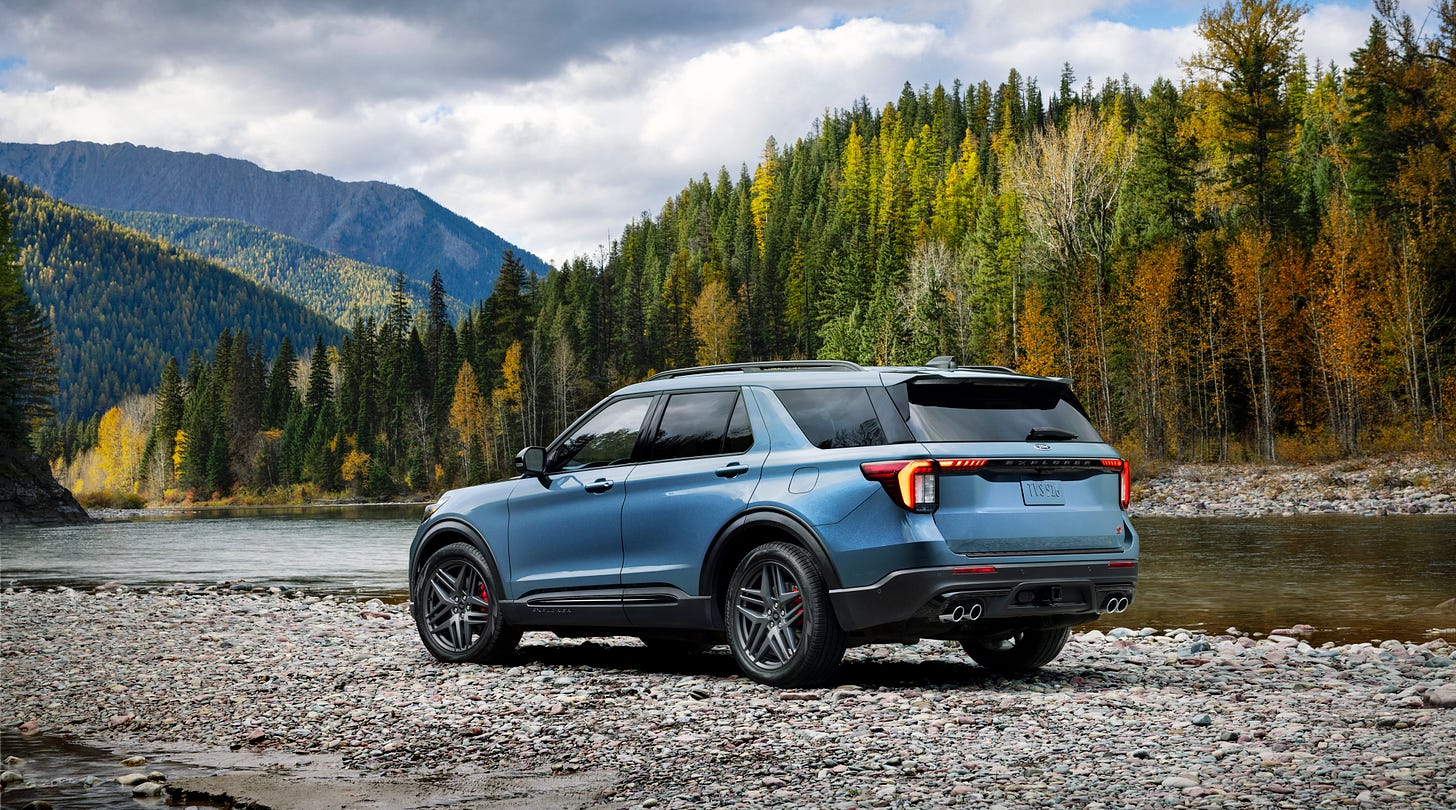2025 Ford Explorer Review
Ford finally embraces the digital age
ANN ARBOR, Mich. — I have a complicated relationship with the Ford Explorer. I’ve driven a few variants of the venerable SUV over the years. Still, I’ve never come away particularly impressed — too much plastic and not enough pizzazz for an ultra-competitive segment.
Ford’s strengths in the past decade or so lay in the full-size Expedition and its pickup trucks (and the Bronco), not its midsize SUV offering. But Dearborn’s designers have been busy, and the refreshed 2025 Explorer sitting before me in rural Michigan promises to right those wrongs.
The first thing that catches my eye isn’t the massive 13.2-inch touchscreen dominating the dash (though we’ll get to that). It’s a simple, elegant solution to a problem that’s plagued car designers for years: where to put your phone.
Just below the giant screen sits a divided cubby — wireless charger on the left, regular storage on the right. It’s not revolutionary, but the thoughtful design makes you wonder why it took so long to come up with a good solution.
This attention to detail extends throughout the cabin. The redesigned interior addresses many of the complaints leveled at the current generation. Gone are the awkward ergonomics and dated tech. Ford has adopted Android Automotive, transforming the Explorer into a rolling computer nearly as smart as the phone in your pocket. This isn’t just another way to mirror your smartphone — it’s a full operating system embedded within the vehicle.
Google Maps, Assistant and even the Play Store are integrated seamlessly into the dash. Want to use Waze instead of Google Maps? Download it directly to your Explorer. It’s a leap forward in automotive tech, though it remains to be seen how extensively this feature will be utilized by consumers and supported by developers. Apple CarPlay and Android Auto are still on hand for the phone-faithful, but Ford’s betting big on Google to bring its in-car tech into the 2020s.
Under the hood of my tester sits a 2.3-liter EcoBoost four-cylinder engine. It’s a peppy little number, capable of hustling this three-row SUV around with surprising verve. But let’s be honest — the real star of the power show is the available 3.0-liter EcoBoost V6, churning out a whopping 400 horsepower. In a family hauler. What a time to be alive.
On the road, the Explorer is a mixed bag. The EcoBoost engine provides ample grunt, but it’s not exactly whisper-quiet. Road noise is more prominent than I’d like, especially with the sportier tire options. Turn up the tunes, though, and you’ll never notice. And, to be fair to the engine, the exhaust note is pretty pleasing.
However, my favorite part of the improved Explorer is that it offers Ford’s BlueCruise hands-free driving system. It’s not autonomous driving, but on premapped highways, you can take your hands off the wheel and let the Explorer handle the steering. The system uses cameras to ensure you’re still paying attention (no napping allowed), but it takes a significant amount of stress out of long highway slogs or endless commuter traffic.
Practicality remains a strong suit. With room for seven (though adults might want to avoid that third row for long trips), plenty of cargo space and various drive modes — including some light off-road settings — the Explorer is ready for everything from school runs to weekend camping trips.
Pricing starts around $41,000 for the base model and climbs into the $60,000 range for a fully loaded Platinum trim. This puts the Explorer alongside segment standouts like the Kia Telluride and Hyundai Palisade. Those Korean twins offer compelling packages with longer warranties, but they can’t match the Explorer’s performance options or its new tech suite. The prior Explorer came out nearly at the same time as the Kia and Hyundai, and the fight was over before it began. But things are more evenly matched now.
The 2025 Explorer isn’t a clean-sheet redesign, but it didn’t need to be. Ford has addressed the most glaring issues of the current generation while adding genuinely useful new tech. The addition of BlueCruise and the Android Automotive system puts it at the forefront of tech in its class, while the potent engine options and improved interior make it a strong contender in the midsize SUV segment.
Is it perfect? No. The road noise could be better managed, and you’ll pay a premium for the top-end ST and Platinum variants. Privacy concerns around data collection and potential cybersecurity risks are worth considering as vehicles become more connected, but this isn’t an Explorer-specific quibble — every new car faces these challenges. For families looking for a do-it-all SUV that can handle the daily grind and weekend adventures with equal aplomb, the new Explorer makes a strong case for itself.
Ford has sold more than 8 million Explorers since its introduction. This latest iteration proves they aren’t resting on their laurels. The Explorer nameplate might be familiar, but this 2025 model is tech-savvy with plenty of oomph under the hood.
The venerable Explorer (remember the Eddie Bauer edition?) represents a new era where cars aren’t just transportation but extensible platforms that can grow and adapt to our needs over time. It’s not quite the trailblazer the original was, but Ford still has a few tricks to teach the new kids in town.








Sounds good EXCEPT for most ratings/ reviews on the Explorer are " not so great".